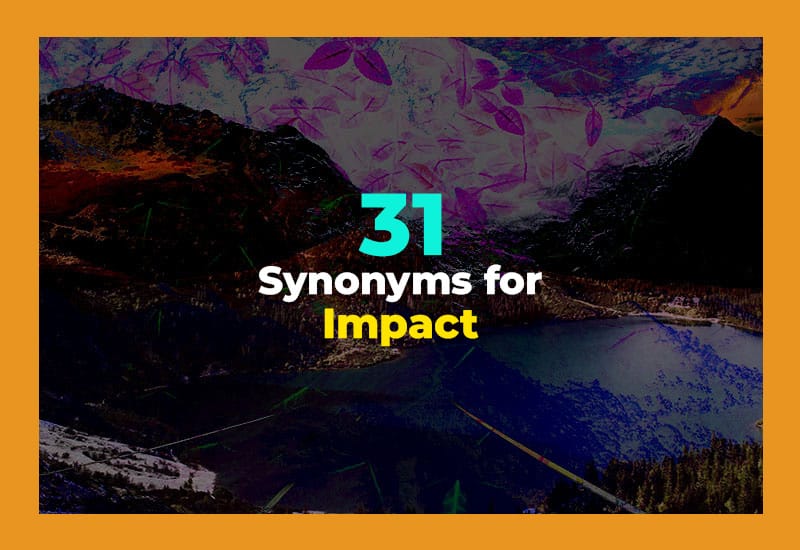You probably use the word impact a lot, but did you know there are plenty of other cool words to say the same thing? Whether you’re talking about the effect of a decision or the force of a hit, these synonyms can help you sound more interesting and clear.
1. Effect
The word effect means the change that happens because of something else. It shows the result or outcome of an action. For example, "The new rule had a big effect on how people behave." It can be used in many areas, like science, everyday life, or feelings. When you want to talk about what something causes, "effect" is a perfect choice. It's simple and clear, so people understand that you are talking about a result. This word is often used in schools and work to explain how one thing influences another.
2. Influence
Influence means the power to change or affect someone or something without using force. For example, "Her teacher's words had a strong influence on her career choice." It can be good or bad, depending on the situation. You can influence your friends by your ideas or actions. It's a gentle way to show impact because it's about guiding or shaping what happens next. Influence is a great word when you want to talk about subtle changes or the power one person or thing has over another.
3. Consequence
A consequence is what happens after an action or decision, especially something important or serious. For example, "Skipping school had serious consequences for his grades." It often means a result that is not always good. People think about consequences when they want to understand what could happen if they do something. This word helps to explain cause and effect, especially in rules, life choices, and events. It shows that every action leads to something, and sometimes we have to face those outcomes.
4. Result
Result is the outcome or end of an action or event. It tells what happened after a process. For example, "The result of the test showed she understood the lesson well." It's used everywhere—from sports to science to daily life. When you want to explain what came from something, "result" is a simple and clear word. It focuses on the end point, what you get after you do something. People use it to share answers, scores, or effects, making it one of the most popular synonyms for impact.
5. Outcome
An outcome is the final effect or conclusion of an event, especially something planned or expected. For example, "The outcome of the game was exciting for all fans." It can be good or bad, depending on what happened. Outcome often relates to situations where decisions or actions lead to a clear ending. It's a helpful word when you want to talk about how things turned out after trying or planning. People use "outcome" a lot in health, education, and business to measure success or failure.
6. Impression
An impression is the effect something or someone has on your feelings or thoughts, usually right away. For example, "She made a good impression during her job interview." It's about the way we perceive or feel about something. Impression can be about people, places, or events. It's less about facts and more about emotions and opinions. When you want to talk about how something feels or looks to you or others, "impression" is a perfect word to describe the personal impact.
7. Shock
Shock means a sudden and strong feeling of surprise or upset caused by an unexpected event. For example, "The news of the accident was a big shock to everyone." It can be physical or emotional. Shock is used to describe moments that change our feelings or thoughts very quickly. It's a powerful word for strong impact that shakes us up. People use it to show how serious or sudden a change or event is. It's great when you want to describe something surprising and hard to accept.
8. Blow
A blow is a strong hit or a sudden event that causes trouble or harm. For example, "Losing his job was a heavy blow to his confidence." It can be physical or emotional. Blow suggests force and difficulty. It's used when something negative happens that changes things in a tough way. People say it when they feel shocked or hurt by bad news or events. "Blow" gives a sense of something hitting hard and causing pain or problems.
9. Force
Force means strength or power used to move or affect something. For example, "The force of the wind broke the tree branches." It's often used in science or when describing physical impact. Force shows how strong or powerful something is when it touches or hits another thing. It can also mean influence that makes something happen. When you want to talk about physical or powerful impact, "force" is a clear and strong word to describe energy or pressure.
10. Collision
A collision happens when two things crash or hit each other. For example, "The collision between the cars caused a traffic jam." It's a physical impact, often involving accidents or crashes. The word describes the moment of contact that causes damage or change. People use it when talking about vehicles, objects, or even ideas that clash. Collision focuses on the event of hitting, showing both the force and the effect of the impact clearly.
11. Jolt
A jolt is a sudden, sharp movement or shock. For example, "The sudden jolt of the bus made everyone hold on tight." It's often a physical bump but can also describe a surprising or shocking event. Jolt is a quick, unexpected impact that makes you react fast. You might feel a jolt when something changes your plans or emotions suddenly. It's a great word for small but powerful moments that shake things up quickly.
12. Crash
Crash means a loud, violent collision or failure. For example, "The crash of the two bicycles startled the crowd." It can be a physical impact like a car accident or a sudden failure like a computer crash. Crash shows something sudden and often destructive. People use it for sounds and events where things break or stop working. It's a strong word for serious impact, especially when damage or disruption happens quickly and unexpectedly.
13. Bang
A bang is a loud, sudden noise often caused by a hard impact. For example, "The bang of the door slamming echoed through the house." It's used to describe sounds made by hitting or crashing. Bang is an informal, easy word that gives a feeling of surprise or suddenness. It often happens with physical impacts but can also describe quick, loud events. People use bang to catch attention or describe noisy accidents or actions.
14. Repercussion
Repercussion means an effect or result, often one that is indirect or happens later. For example, "The repercussion of his mistake was losing his promotion." It suggests a consequence that might not be immediately obvious but is important. Repercussion is used to talk about results that follow from actions, especially when they affect others or happen over time. It's a good word to show how impact can spread and create more changes beyond the first event.
15. Aftermath
Aftermath is the period or result following a bad event. For example, "The aftermath of the storm left the town without power." It's about what happens after something serious or harmful. Aftermath often focuses on cleaning up, recovery, or dealing with consequences. The word helps describe the long-term effects and the state of things after the initial impact. It's useful for talking about the final results of disasters, accidents, or big changes.
16. Reaction
A reaction is how someone or something responds to an event or action. For example, "His reaction to the surprise party was pure joy." It shows the effect of an impact on feelings or behavior. Reaction can be quick or slow and can be emotional, physical, or verbal. It's important because it helps us understand how people or things change after experiencing something. When you talk about impact on mood, thoughts, or actions, "reaction" is a clear and relatable word.
17. Footprint
Footprint means a mark or effect left behind by something. For example, "The company's carbon footprint shows its environmental impact." It's often used to describe lasting influence or changes, not just physical marks. Footprint is great when talking about the long-term effects of actions, like pollution or memory. It shows how impact can stay with us or the world over time. This word is useful for talking about what remains after an event or action has passed.
18. Trace
A trace is a small sign or evidence of something that was once there. For example, "The detective found traces of the suspect's fingerprints." It's a subtle impact, showing that something has touched or affected a place or thing. Trace is about the little changes or marks left behind. It's helpful when talking about minor or hidden effects, especially in science, nature, or investigation. Trace shows that impact doesn't always have to be big—it can be just a tiny clue or change.
19. Fallout
Fallout refers to the negative effects or problems that come after a bad event. For example, "The political fallout from the scandal lasted for months." It often means the hidden or slow damage that happens after a crisis. Fallout is commonly used for social, political, or personal impacts. It helps describe how one event can create ongoing trouble or consequences. This word is great for showing that impact can spread and cause more issues than expected.
20. Echo
An echo is a repeated sound or effect that comes after the original one. For example, "Her words had an echo of hope in the room." It's used to describe how impact can continue or repeat over time. Echo can be physical, like sound, or more abstract, like ideas or feelings that linger. This word shows how something can have lasting influence beyond the first moment. Echo is perfect for describing soft but continuing effects that stay with us.
21. Resonance
Resonance means a deep, lasting effect or connection that goes beyond the surface. For example, "The speech had a resonance that touched everyone's hearts." It's about how impact can create strong feelings or ideas that continue to grow. Resonance is often used in music, emotions, or ideas. It shows that impact isn't just quick but can be meaningful and powerful over time. When you want to describe deep influence, "resonance" is an elegant and thoughtful word.
22. Wave
A wave is a moving line or a series of events that spreads from a point. For example, "The wave of excitement spread through the crowd." It shows how impact can travel or grow, affecting many people or places. Wave is used both for physical movement, like water, and abstract ideas, like emotions or news. It's a great word for describing impact that spreads widely and changes things over time. Waves remind us how one action can create many reactions.
23. Ripple
A ripple is a small wave or effect that moves out from where something happened. For example, "The decision caused ripples throughout the entire company." It's used to describe gentle but spreading impact. Ripple shows how even small actions can cause changes that grow larger over time. People use it to explain how effects move quietly and slowly, not always loudly or suddenly. It's a perfect word for subtle but important impacts that reach far beyond the start.
24. Clout
Clout means power or influence that affects decisions or events. For example, "She has enough clout to change company policies." It shows the ability to make an impact through authority or reputation. Clout is often used in politics, business, or social groups. It focuses on the strength behind the influence rather than the effect itself. When you want to talk about someone's power to cause change, "clout" is a sharp, modern word that describes impact through control.
25. Power
Power means the ability to control or influence things or people. For example, "The power of the storm destroyed many homes." It can be physical strength, authority, or energy. Power often causes a strong impact because it can make big changes or force actions. People talk about power when discussing governments, machines, or emotions. It's a broad word that covers many types of impact, especially when something or someone has control or force over others.
26. Punch
Punch means a strong hit or a forceful effect. For example, "The boxer's punch knocked out his opponent." It shows a quick, powerful physical impact. Punch is also used in expressions to describe something with strong influence or excitement, like "this movie packs a punch." It's a lively, energetic word perfect for describing sharp and effective impact, whether physical or emotional. Punch gives a feeling of strength and surprise in how something hits or affects.
27. Smash
Smash means to break something into pieces by hitting it hard. For example, "The vase smashed when it fell off the table." It describes a violent impact that causes damage or destruction. Smash is often used with accidents, fights, or crashes. It gives a strong visual of force and noise. People also use "smash" to talk about winning or success in sports or music. It's a powerful word for impact that breaks, shakes, or changes things suddenly.
28. Thrust
Thrust means to push or move suddenly and forcefully. For example, "He thrust the door open quickly." It's a physical action that creates impact by moving something with strength. Thrust can also mean pushing ideas or efforts strongly forward. It's often used in fighting, machines, or sports to describe sudden forward movement. Thrust shows force and speed, making it a great word for impact that moves or changes position quickly and strongly.
29. Hit
A hit means a strike or a success. For example, "The ball hit the wall with a loud noise." It can be physical contact or achieving something well, like "the song was a hit." Hit is a very common and easy word for impact. It shows when something touches or affects another thing. People use it in many ways, from sports to business to everyday talk. It's simple and clear, making it one of the best words to describe impact.
30. Brunt
The brunt is the main force or worst part of something bad. For example, "The city took the brunt of the storm's damage." It shows the strongest impact or effect that someone or something feels. Brunt is often used when talking about disasters, criticism, or problems. It focuses on who or what suffers most during a difficult event. When you want to describe the hardest-hit part or person, "brunt" is a precise word to use for impact that hits strongest.
31. Ram
To ram means to push or hit something with strong force. For example, "The car rammed into the wall during the accident." It shows a violent and direct physical impact. Ram is often used in accidents, fights, or actions where something is forced quickly into another thing. It gives a clear picture of power and sudden contact. People use ram to describe collisions that are aggressive and strong. It's a sharp, active word for impact that happens fast and forcefully.

Final Thoughts
You now have 31 different ways to say impact, each with its own special meaning and style. These words can help you describe effects, forces, and results in clearer, more interesting ways. Whether you want to talk about a strong hit or a subtle change, this list has got you covered. Using these synonyms will make your writing and speaking more colorful and precise. Next time you want to explain how something affects something else, try one of these words for a fresh twist!









